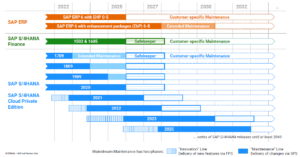CONSULTING
Drivers for accelerating the transition to S/4HANA
Julio de Miguel Calleja
SAP Business Development Director | Linkedin
Evolution from SAP ERP to SAP S/4HANA.
SAP ERP (Enterprise Resource Planning) is a comprehensive solution that many companies have used for years to manage their business processes. However, SAP S/4HANA is the evolution of SAP ERP, designed to take advantage of SAP HANA’s in-memory database technology.
Support for SAP ERP will end in 2027, meaning that companies that do not migrate to SAP S/4HANA will not receive upgrades or technical support. Conducting an early conversion process ensures that companies will continue to receive critical support and upgrades.
An early conversion to SAP S/4HANA not only modernizes a company’s technology infrastructure, but also strengthens its ability to innovate and remain competitive in an ever-changing business environment.

Converting our SAP system to S/4HANA not only modernises a company’s technology infrastructure, but also boosts its ability to innovate and stay competitive in an ever-changing business environment.
Key Differences between SAP ERP and SAP S/4HANA
These are just some of the key differences between SAP ERP and S/4HANA:
- Architecture: SAP ERP uses traditional databases, while SAP S/4HANA is based on SAP HANA in-memory database technology, enabling much faster and more efficient data processing.
-
- User interface: SAP S/4HANA offers a modern and intuitive user interface via SAP Fiori, which significantly improves the user experience compared to the legacy SAP ERP interface.
- Process simplification: SAP S/4HANA simplifies data structure and business processes, eliminating redundancies and improving operational efficiency.
- Analytical capabilities: With SAP HANA, S/4HANA enables real-time analytics and advanced predictive analytics and machine learning capabilities.

As a result of these differences, S/4HANA has the following advantages over SAP ERP, which we will be able to start benefiting from as soon as we complete our conversion process.
- Improved performance: SAP HANA’s in-memory technology enables extremely fast data processing, improving overall system performance.
- User experience: The SAP Fiori interface provides a more intuitive and customizable user experience, making the system easier to adopt and use.
- Integration and flexibility: SAP S/4HANA integrates all business processes on a single platform, facilitating cross-departmental collaboration and informed decision-making.
- Digital transformation: SAP S/4HANA is designed to support the digital transformation of businesses, enabling greater agility and innovation.
Agility and Flexibility with RISE with SAP
S/4HANA systems can be licensed in an on-premises model (perpetual and proprietary license) or in a cloud model through initiatives such as RISE with SAP, a bundle of products that complement S/4HANA. The key benefits of this licensing model over the on-premises model are as follows:
- Agility and flexibility: RISE with SAP enables companies to be more agile and flexible, adapting quickly to market changes and business needs.
- Cost reduction: By migrating to the cloud, companies can reduce operational and infrastructure costs by letting SAP take care of system maintenance and management.
- Enable continuous innovation: RISE with SAP enables continuous innovation through automatic updates and access to the latest technologies, such as artificial intelligence and machine learning.
- Security and compliance: SAP ensures high standards of security and compliance to protect business data and operations.
- Scalability: Cloud solutions enable resources to be scaled according to business needs, resulting in greater efficiency and resource optimization.
- Functionality: Rise with SAP integrates additional products such as group reporting, credits for BTP usage and artificial intelligence services, Build Zone or Build Automation.
By migrating our SAP system to S/4HANA, we are not only modernizing our technology infrastructure. We are also strengthening our ability to innovate and remain competitive in an ever-changing business environment.




